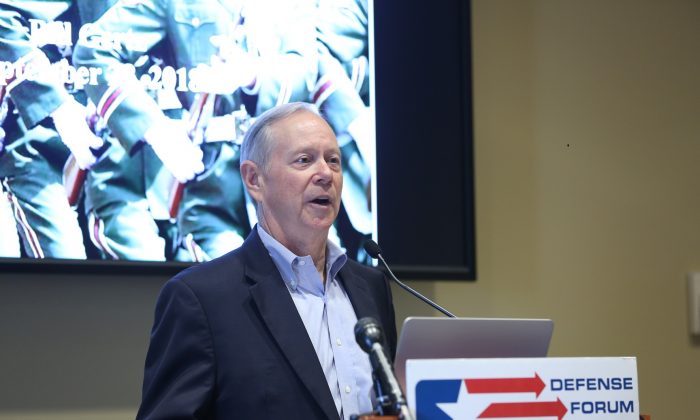By Jennifer Zeng
“The good news is, there has been a major shift by the Trump administration in its focus on China,” Gertz said while speaking at a Defense Forum Foundation luncheon on Sept. 28 in Washington.
How Did We Get China Wrong?
Gertz said the United States misunderstood China back when he published his book “The China Threat” in 2000 and has continued that lack of understanding since. As an example, he recalled how a three-star general, who was the director of the Defense Intelligence Agency, insisted to him that China wasn’t a threat “because they said they are not a threat.”
“This gives you a sense of the power of the influence of policies that had allowed U.S. government and policy elites outside the government to get China wrong,” Gertz explained.

“What’s little known is that he has made tens of millions of dollars in China arranging for American businesses to do business in China.”Gertz said that Henry Kissinger, who served as secretary of state during the Nixon administration, represents the wrong way of thinking about China.
According to Gertz, U.S.–China policy progressed throughout the past several decades to the point that during the Bush administration, Secretary of State Condoleezza Rice said, “We want a strong China.”
“Guess what? We’re now having a strong China. And it is affecting every aspect of our system: our economy, our technology, our innovation, which is the engine of our economy. It is affecting our military, our intelligence,” Gertz said.
‘The China Threat’ Explodes
Gertz said a lot of things that he reported about in his book “The China Threat” have “exploded” in the past 18 years, which is why he titled his speech, “The China Threat 2.0.” The “exploded” issues include China’s proliferation activities, intelligence activities, and technology theft.
Although Kissinger is trying to make sure the United States doesn’t take a hard line on China, things are different now with the Trump administration, Gertz said.
The Trump administration, for the first time, announced last week that the Chinese were behind the 2015 attack on the U.S. Office of Personnel Management, during which 22.1 million records were stolen, he said.
“During the Obama administration, they refused to blame China,” Gertz said.
“The Chinese are now utilizing those 22.1 million records, including those of every security holder in the U.S. government.
“I am told by the U.S. government that the Chinese are using artificial intelligence as a way to go after target people who are either recruits for giving espionage or somehow could be used to get further cyber attacks,” Gertz said.
Chinese Military’s No. 1 Priority
Gertz reminded the audience that the Chinese military isn’t a traditional, national army. It is a political army, the army of the Communist Party in China, and it is very different from the U.S., British, or French armies.
“Its No. 1 priority is not the protection of China: It’s the protection of the ruling Communist Party of China,” Gertz explained.
He said that cyber attacks from China are massive. It’s estimated that about $500 billion worth of some of the most valuable U.S. technology has been stolen by the Chinese Communist Party.
Economic Warfare and Influence Operations
“Economic warfare” is another aspect of the “China Threat 2.0.” The White House released a report in June that announced that China is engaged in “economic aggression.”
“And this has been the basis of Trump’s trade war that is now facing with China,” Gertz said, “This is the first time in a long time that the U.S. government is really, aggressively countering this massive program.”
China’s influence operations are also part of the “China Threat 2.0.” President Donald Trump announced at the U.N. Security Council meeting last week that “China is seeking to influence the U.S. midterm elections.”
Gertz said he had received information from other sources that the Chinese Communist Party is trying to help the Democrats win control of Congress, and, thereby, defeat the Trump administration’s aggressive and tough posture on trade and Chinese technology theft.
















